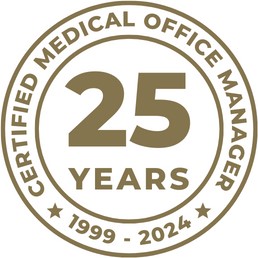The knowledge needed to manage the business of healthcare is continually changing. Red and white HCFA 1500 forms have been replaced by 837s. Paper charts and filing cabinets have been replaced by electronic medical records (EMRs). Electronic funds transfers (EFTs) have mitigated daily bank deposit runs. It’s been almost 8 years since the USA transitioned to ICD-10-CM. In healthcare years, that seems like a lifetime ago. We’ve made it through significant industry, national, and global impacts. Internally, our practices and organizations have remained resilient, in part due to our efforts.
Every article that we read, every webinar that we join, each program attended—adds to our knowledge base. Our professional development as medical office managers is critical to the sustainability of our practices, providers, and staff. Information passes through us and impacts them, which secures the foundation we all depend on. Taking on a leadership role requires that we prioritize our own continuing education and professional development.
Many of us move up in the ranks and receive on-the-job (OTJ) training in our positions, learning most of our skill base from other employees, who also pass on their knowledge gaps to us. To fill gaps in my own knowledge, I discovered the importance of investing in myself through certification. Let’s back up to state the obvious, the value of a formal education and/or earning degrees cannot be overstated. However, certification is in a league of its own. Certification is an intentional, specialized, often rigorous process that is typically undergone with several or more competing priorities—marriage, kids, extended family, and daily work obligations. With certification, there aren’t makeup assignments, or professors to convince of your aptitude, or semesters to figure out a concept. Course curriculum for certification is strictly based on current industry standards from experts active in the field who are pulling standards directly from real-life circumstances rather than theory. Certification is pass or fail. There are opportunities to try again, but overall, it’s a commitment to demonstrate expertise.
Certification is the industry recognition that you have mastered selected subject matter that is a standard of excellence that others in the discipline are following with success. Those letters behind your name signify your acceptance into a community of other professionals who have prioritized being the best at something.
To equip medical practices with the tools for sustainable success, we need more certified medical practice leaders. Jumping back into my personal journey, there was a desire to have multiple certifications—but not because I love having an alphabet soup trail behind my name. My goal is to diversify my expertise over several areas to maintain a holistic understanding of factors that strengthen my approach to transformation.
With newfound courage, I took what I learned to enact new policy changes in my organization and never stopped sharing knowledge with others.
My first certification was earned 18 years ago through Practice Management Institute (PMI). Prior to receiving the Certified Medical Office Manager (CMOM) designation, I held management positions for at least 7 years. Light bulbs continually went off for me during and after the certification process. Following along with the instructor and certification materials, so many concepts that I’d learned on the job became clearer—the origins and context of so many regulations and industry norms finally made sense. With newfound courage, I took what I learned to enact new policy changes in my organization and never stopped sharing knowledge with others. Applying best practices to real circumstances with the ability to measure success through benchmarking was a game changer for the practices I worked with and for my confidence as a leader.
CMOM, now in its 25th year as an industry-leading certification, adds to the foundational skills that you’ve gained through either formal education or OTJ training. It adds a deeper level of understanding to industry terms like PHO, CIN, CARC, SGR, RVU, and CDM. Attaining certification is unique in that the lessons learned establish unmatched technical skills required to successfully lead practices into the future.
- Higher earning potential
- Internal and external credibility as a subject matter expert
- Access to resources not readily available to the public
- Inclusion in a network of like-minded professionals
- Inspiration and motivation for others to seek professional development
Additional certification benefits include:
Leaders and organizations across the country have made the decision to invest in their skill sets—it’s what strengthens us to face challenges, especially when the buck stops with us as practice leaders. Here’s what a few CMOM graduates had to say about their certification experiences:
“I thought I knew everything I needed to perform my duties. This class was an eye-opener! I have been in my job for 10+ years and I can only wish I had taken the course back then. Incredibly valuable information no matter how much experience you have. Highly recommend.” —Jacquelyn Arzooyan, CMOM, Ann Arbor, MI
“As we went through the program, I could not imagine managing a practice without the material that is covered in the course. I truly feel it is vital for any type of practice in the medical field. As a matter of fact, the information covered can be utilized in any management role. CMOM has given me the confidence to move ahead with my goal to be in the medical field and I'm proud to be a CMOM.” —Dwayne Downs, CMOM, Newark, DE
The career equivalent to “self care” is “professional investment.” As you embark on achieving your career goals, consider strategies that give you the opportunity to pour back into yourself. Certification is the return on your professional investment. The continuing education units (CEUs) required to maintain certification are our drivers to remain vigilant to protect and enhance our certification investment by consistently seeking out new information. CEUs also spark our leadership creativity, innovation, and problem-solving skills, which improve our practices and communities.
As leaders, we are tasked with shifting and adapting to internal and external factors. Innovations and industry changes such as artificial intelligence, telehealth, value-based payment modeling, and information blocking (as defined in the CURES Act) have ushered in new expectations for healthcare leadership. The landscape will not stop evolving and neither should we.
About the Author

Kem Tolliver is President of Medical Revenue Cycle Specialists, an instructor and content creator for the Practice Management Institute, and coauthor of Revenue Cycle Management: Don’t Get Lost in the Financial Maze.



